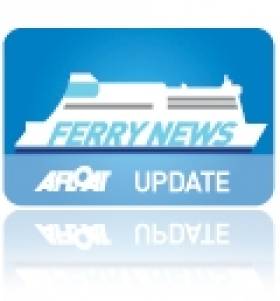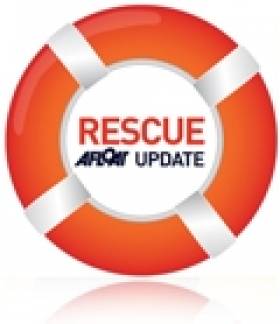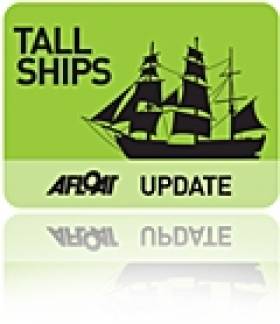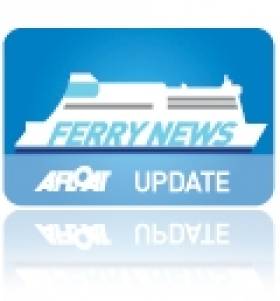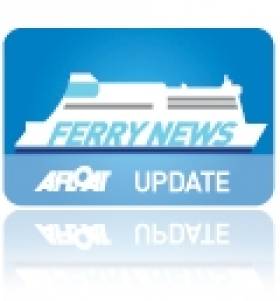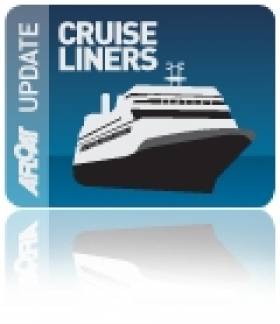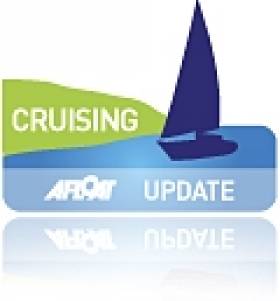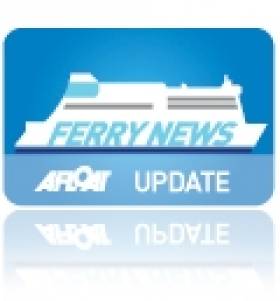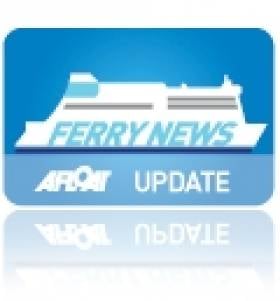Displaying items by tag: The Gathering 2013
#Rail&Sail – Irish Rail have amendment the Rosslare Europort-Dublin railway service so to provide 'greater connectivity' for ferry passengers, albeit the new schedule was only introduced for this year of The Gathering, writes Jehan Ashmore.
The National Transport Authority approved the amended rail timetable which started this month and remains valid until 2 September.
The changes are to improve certain connection times between ferries arriving in the Wexford port and passengers making onward rail journeys to the capital and beyond.
Special Gathering travel tickets have been introduced by Irish Rail and Bus Éireann to give ticket holders unlimited travel across both companies' extensive networks for either three days or seven days.
Below are the changes made to the Rosslare Europort-Dublin (Connolly Station) service schedule.
- The 17:55 Rosslare Europort to Connolly will be deferred until 19:15 Monday to Saturday.
- The 17:36 Connolly to Wexford service will depart at usual time but there will be an extended journey time between Enniscorthy and Wexford with an arrival time of 20:25 into Wexford Monday to Friday.
- On Sundays the 17.40 Rosslare Europort to Connolly will be deferred to 19:00.
Rosslare Europort is unique in that the harbour is operated by the state owned transport company and from where three ferry operators run routes to Wales and France, including the seasonal-only Roscoff route which resumed recently.
Kerry Calls Emergency Workers For 'Heroes Week' This June
#Rescue - Emergency workers with Irish heritage from all over the world are being invited to celebrate Heroes Week in Tralee this June.
As part of The Gathering 2013 initiative, the chiefs of Co Kerry's emergency services will welcome first responders with Irish heritage - or an affinity for Ireland - for a week-long reunion among colleagues in Ireland.
That means any members of the police, fire service, coastguard, ambulance service, the Red Cross and the RNLI the world over!
Visitors will be declared 'guests of honour' in Tralee for the week, and among the various events planned between 12-17 June, they will have a chance to trace their Irish roots, and sightsee around one of Ireland's most picturesque spots.
And what's more, the not-for-profit event aims to raise funds for vital local rescue and lifesaving services.
As reported on Irish Central, Mayor of Kerry Terry O'Brien said: “We salute the men and women who go to work each day with only one purpose in mind – to protect and save lives. Many of them have Irish roots and we want to invite them home.
"Kerry has a strong tradition of volunteerism and a collective pride-of-place that will see us roll-out the red carpet to welcome our Heroes home to the Kingdom County. I hope you can join us and we assure you of a memorable visit with us and a warm Irish welcome.”
Full details of the event, including booking information, are available on the Heroes Week website HERE.
The 'Greening' of the Jeanie
#GreenTallShip- The 'greening' of our national iconic landmarks and those throughout the World are increasing in number as each St. Patrick's Day passes. Yet what about those of a floating nature, as in the case of the Dublin Docklands based Jeanie Johnston which was given a 'greening', writes Jehan Ashmore.
She is a 19th century replica emigrant ship which made her historic voyage to the United States a decade ago. For several years now the vessel has remained on this side of the giant pond, albeit in a static role, however she still has an important part to play as a tourist visitor attraction under the name of the 'Jeanie Johnston Museum Ship'.
The original 408-tonne cargoship 'Jeanie' sailed between Tralee, Co. Kerry and North America during the years 1847 to 1855. In that timeframe she carried thousand's fleeing from famine and on 3,000 mile voyages across the Atlantic in conditions braving gales and harsh seas.
How times have dramatically changed as the Irish Diaspora and visitors alike came to our shores to witness the gathering of the parade in the city-centre and the proudly lit-up tallship moored downriver along Custom House Quay.
Celtic Link Ferries Bring Visitors for St. Patrick's Gathering
#GatheringVoyage – As previously reported on Afloat.ie Celtic Link Ferries were proud to have transported over 400 passengers on board Celtic Horizon from mainland Europe to Ireland for St. Patrick's Day 2013.
The only ferry company which sails between Ireland and France (Cherbourg-Rosslare) all-year-long gave passengers a unique opportunity last weekend to sail with a vehicle, a cabin and occupants for only €1.
The special priced fare was tied to promote Ireland's year-round Gathering celebration and to encourage people to visit Ireland.
"There was a great atmosphere on board, people delighted with the great offer and getting to come home and see their loved ones" said Tourist Passenger Manager, Rory McCall.
"Celtic Link Ferries did their best to insure that people got to visit Ireland for St. Patrick's Day as comfortably as possible, as cheaply as possible."
McCall added "This will be the first of many offers trying to increase visitors to Ireland and more specifically to Wexford and the rest of the South-East".
"Celtic Link Ferries have been very fortunate to have the support of Rosslare Europort on this offer and look forward with working with them on more special offers for the rest of 2013."
Throughout 2013 Celtic Link Ferries will be offering competitive fares to insure that even more tourists visit Ireland on the thrice-weekly operated Cherbourg-Rosslare route.
Euro-Celtic Countdown! as Gathering Looms Over the Horizon
#GatheringVoyage- Passengers booked on a Celtic Link Ferries sailing from France one month from today (15 March) in advance of St. Patrick's Day, will be taking advantage of a special €1 euro 'Gathering' fare, writes Jehan Ashmore.
The special offer was an initiative by CLF in this year-long Gathering of events and next month's National Day of festivities.
Celtic Horizon operates three round-trip sailings weekly and among the 27,522 tonnes ro-pax facilities are the Cherbourg Café, Tuskar Lounge and Rosslare Bar. In addition there are a choice of cabin accommodation for the overnight 17-hour crossing between Normandy and Wexford.
Rory McCall, passenger sales manager said "Celtic Link Ferries will ensure that passengers get great value crossings to and from France all year long in 2013. It is only fitting that we give our passengers the best value deal ever between France and Ireland on 15 March".
This month CLF celebrate their eighth year in service, having taken over the route in 2005, following the closure of the service the previous year run by P&O Ferries.
The Gathering Brings Bonanza with Record Liner Calls to Dublin Port
#GATHERING LINERS – A record number of cruiseships are to call to Dublin Port during the inaugural Gathering in 2013, where for the first time the number of cruiseship calls will surpass 100 during the season, writes Jehan Ashmore.
In 2013 the capital port is to welcome a total of 108 calls, (including several ships making repeat calls) stretching between April to October. Last year, 90 such ships made individual calls to the capital which welcomed 100,000 passengers and bringing between them €35-50m to the local economy.
The rise in cruise calls reflects Dublin Port Company's Masterplan 2012-2040, as previously reported on Afloat.ie, where the masterplan has included identifying the need to construct a new cruise facility by 2015, at the North Wall Quay Extension close to the East Link Bridge.
Launching the season will be the 700 passenger Discovery which although not new to Dublin Port, her arrival in early April will be a first under the Cruise & Maritime Voyages brand, having repalced Ocean Countess. The Discovery will also continue to maintain cruises for owners Voyages of Discovery.
Among the usual operators is Princess Cruises regular Caribbean Princess, however, the Gathering will be attracting several newcomers to include US based operator Carnival Cruises, whose giant Carnival Glory (2003/ 110,239 gross tonnes) has a capacity for almost 3,000 passengers and more than 1,100 crew.
Dublin Port can also look forward in welcoming a maiden port of call by the $547m MSC Magnifica in May. The 294m long newbuild is a larger fleetmate of Mediterranean Shipping Company's MSC Lirica, which last year made a debut docking to Dublin Port and to Cork (Cobh).
'The Gathering' Cruise to Attract 100 Boats for East and South Coast Voyage
#cruising – A 19–day event next July 2013 with 100 cruising boats and 600 crew members will form the Gathering Cruise along the east and south coasts of Ireland.
The Irish Sailing Association (ISA) and the Gathering Ireland 2013 today announced details of the Gathering Cruise 2013. The event aims to bring together a flotilla of yachts from across the UK, Europe and further afield as they sail to Irish ports as part of Gathering Ireland 2013.
The Gathering Cruise, which will commence in Dublin, is expected to continue along the Cork and Kerry coastlines and the Irish Sailing Association hope it will be an opportunity to raise awareness of Ireland's marine tourism infrastructure while profiling Ireland's stunning coastline and coastal towns as a cruising destination for both sail and power boats.
Project Director of The Gathering Ireland 2013 Jim Miley "The Gathering Ireland is delighted to announce this high seas partnership. The sailing community is such an important part of Ireland's tourism industry and this innovative partnership and Gathering Cruise will form a key part of the Gathering Ireland 2013 calendar. The Gathering Cruise also captures what the Gathering Ireland is about- bringing people who have an interest or a link to Ireland in 2013 to be part of it."
Sail to Ireland with Celtic Link for Next to Nothing!
#FERRY NEWS - Celtic Link Ferries have announced their best ever ferry deal between France and Ireland to coincide with The Gathering 2013.
On Friday 15 March 2013 - in time for the St Patrick's Weekend festivities - all vehicles will sail from Cherbourg to Rosslare Europort for just €1 each.
The fantastic deal is inclusive of a vehicle, cabin and the people in the cabin - but act fast, as this 'next to nothing' offer is available for this one day only.
“Celtic Link Ferries are simply bringing in as many passengers as they can - for as little price that they can,” says passenger manager Rory McCall.
Bookings for this day can be made at www.celticlinkferries.com.
A Celtic Link Voyage to The Gathering 2013
#FERRY NEWS – Celtic Link Ferries are to participant in Ireland's The Gathering 2013, a year-long initiative to celebrate all things Irish, with a unique opportunity to take a car from France on their Cherbourg-Rosslare service for free, writes Jehan Ashmore.
The special offer is limited to the sailing scheduled to depart Cherbourg on 15th March, with an arrival the next day to Rosslare Europort, in advance of the nation's annual celebrations on St. Patrick's Day.
Those travelling on this sailing will have the chance to sample the Celtic Horizon, the newest and fastest ship sailing on this route between Normandy and Wexford.
Among the facilities on board the 27,522 tonnes vessel is the forward facing restaurant, the Cherbourg Café Lounge and adjoining children's playroom, cinema and Wi-Fi. Accommodation is provided in 110 cabins and vehicle decks for 200 cars and up to 120 freight trucks.
For further details of The Gathering voyage and other offers visit: www.celticlinkferries.com


























